'It was surreal': Edinburgh remembers Fall of the Berlin Wall 30 years ago


People across Germany will today mark the 30th anniversary of the Fall of the Berlin Wall on November 9 1989 as an event which has left an enormous impact on German and world history.
But among the Germans were many Scottish people living in Berlin who vividly remember the events of that historic day.
Advertisement
Hide AdAdvertisement
Hide AdPeter Sutton, 54, is now a Church of Scotland minister at St Cuthbert’s Parish Church on Lothian Road.
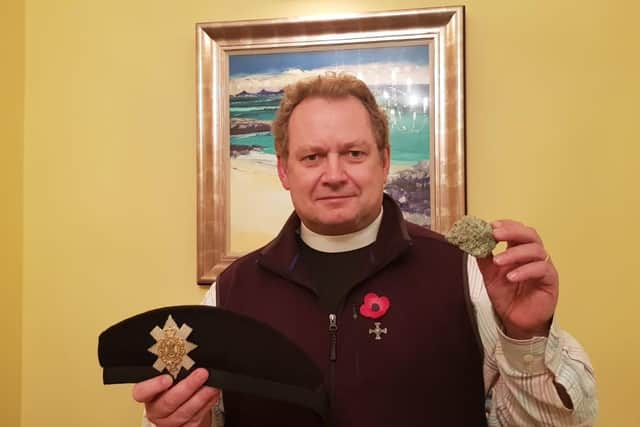

But 30 years ago Rev Sutton was patrolling the Berlin Wall as a platoon commander in the British Army, charged with protecting the British sector of Berlin up until just a few months before the fall of the Wall.
He said: “I really enjoyed my tour in West Berlin because it was an exciting, vibrant place to be.
“Our role was to ensure that the Russians did not take over the city and make it part of East Germany.
Advertisement
Hide AdAdvertisement
Hide Ad“It was a city full of ‘spies’ and an exciting posting everyone wanted because historically it linked you back to all those War Films and Commando Comics we had grown up with.
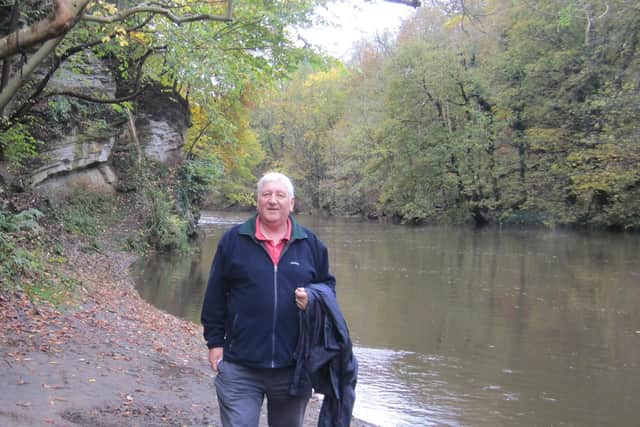

“I was stationed there until a few months before the Wall fell and although Berlin did not feel dangerous per se, people were still being shot if they came over it.”
Rev Sutton, a platoon commander with the 1st Battalion Black Watch, was on UK soil in a heavily fortified army patrol base when the Wall came down.
The minister, who attended the Royal Military Academy Sandhurst, said a Russian officer he met gave him an inkling something significant was about to happen just before he left.
Advertisement
Hide AdAdvertisement
Hide Ad“There was a British military train that connected Berlin to West Germany and travelled through the iron corridor and my job as train officer was to present passports for inspection,” he said.
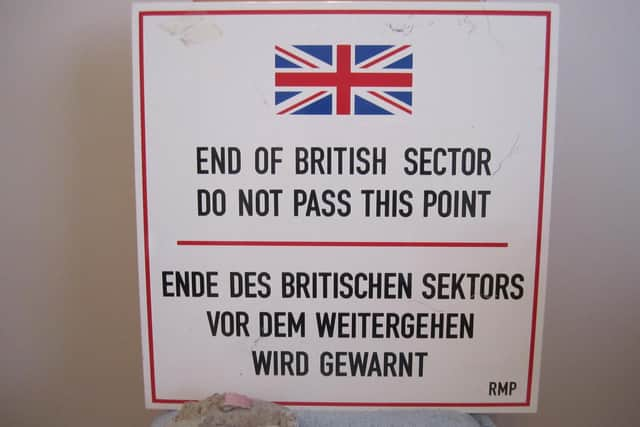

“I was chatting with the inspecting Russian officer and asked him if he thought we would be doing this in 20 years’ time and he said ‘I think there are about to be big changes’ and a couple of months later the Wall came down.”
Speaking in a personal capacity, Rev Sutton said: “for me, the fall of the Berlin Wall symbolised triumph and hope over potential disaster, a bit like that piece of beautiful music, Beethoven’s Ode to Joy.”
“Watching it come down was a joyful moment and historically, if you were to follow the pattern of the Cold War it should have ended in mutually assured destruction.
Advertisement
Hide AdAdvertisement
Hide Ad“But people realised that was not the way to go and it was much better to tear down barriers and make it open and possible for people to engage and travel amongst each other.
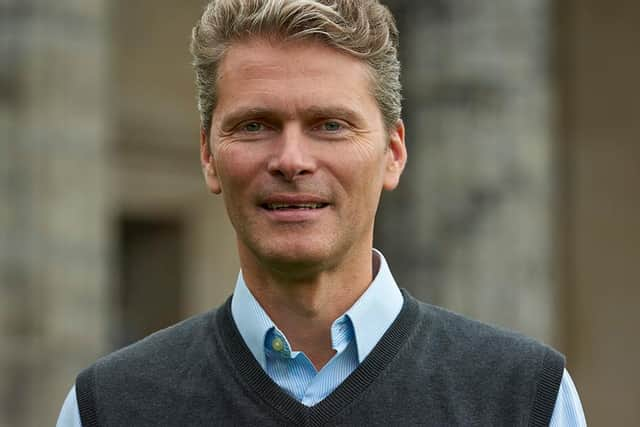

“But here we are on the cusp of leaving the European Union and I think walls are being built again which is very sad,
Peter Locke, a retired Porter at the Scottish Parliament, was posted to Berlin in 1973 as a Piper with the Kings Own Scottish Borderers, before transferring to the Royal Military Police.
He regularly patrolled the Wall and worked at both Checkpoint Charlie and Checkpoint Bravo, where Allied travellors were provessed through the ‘Berlin Corridor’ to Helmstedt in West Germany.
Advertisement
Hide AdAdvertisement
Hide AdMr Locke was on his last posting at Sennelager in 1989, where he was the Duty Officer for the Military Police.
He said: I was in the bathroom getting ready to go out and visit the Duties at the Police Station when my Son, Mark who was then about 15, came banging on the door shouting, ‘Dad, Dad they’re knocking the wall down’.
“I thought it was something local and wondered ‘what the hell am I going to have to deal with tonight’ - of course it was the first news coming through of the fall of the Berlin Wall.”
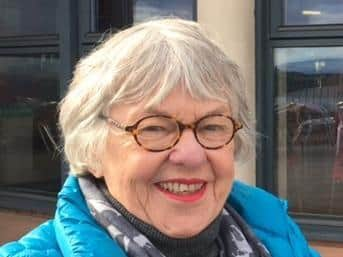

Mr Locke returned to the site of the Wall in 1990 with his family, and was able to take home a piece of the Wall which he still has today, along with a Royal Military Police warning notice marking the end of the British sector.
“I was keen to see the place with the Wall down,” he said.
Advertisement
Hide AdAdvertisement
Hide Ad“We drove and were amongst the last travellers to process through the Corridor and the Russian Checkpoints.
“The easing of tension was tangible and our daughter, then a teenager, got cheeky waves from the Russian Soldiers as we drove off.
“That would never have happened before.”
Colinton-based Elspeth MacGregor, 78, was living and working in Bonn, West Germany as an English teacher.
She often travelled to Berlin for work.
“It was an incredibly exciting time,” she said.
“The wall was this horrible, terrible, immovable thing.
“And then all of a sudden that day people were jumping on the wall and singing. And nobody was shooting at them, I just could not believe it.”
“So many people had been killed trying to cross the Wall.
“It was frightful, they were shot and just left to bleed.
“That’s why it was so incredible when it came down.”
Advertisement
Hide AdAdvertisement
Hide AdIn the period between 1961 and 1989 around 5,000 people successfully defected from East to West Berlin.
The exact number of people who were shot in the attempt by East German border guards is disputed.
Director of the Checkpoint Charlie Museum Alexandra Hildebrant has estimated the figure to be around 200.
The Stasi, the security ministry of the East German government, denied that guards had been given a ‘shoot-to-kill’ order.
Advertisement
Hide AdAdvertisement
Hide AdBut in 2007 an order was discovered, dated 1973, which instructed soldiers not to hesitate in using a firearm on those trying to cross, including women and children.
Tico Seifert, 51, was born in West Berlin, where he lived until 2008, when he moved to Edinburgh for a job as Senior Curator at the National Galleries.
In 1989 Mr Seifert was a medical student, and also had a job in a cafe.
He said: “On the day the wall came down I had the afternoon shift. It was when the evening shift came in that a colleague said to me: ‘the wall is open, they are coming over.’”
“It was surreal, it was very unexpected for all of us.
Advertisement
Hide AdAdvertisement
Hide Ad“We had guests from East Berlin in the cafe that evening. It was very moving, and there was a celebratory atmosphere.
“We gave them a drink for free - either they had no Deutschmarks, or if they did, we knew it would have been a lot of money for them.
“I had several family members in East Berlin, and while we had been able to visit them they were not allowed to come to us. So when the wall came down it was a very emotional moment for my family.”
Beata Kohlbek, 50, is a Teaching Fellow at Edinburgh University who was born and raised in Poland.
Her family moved to West Germany in 1988.
Advertisement
Hide AdAdvertisement
Hide Ad“We didn’t anticipate that socialism would collapse, and it seemed we would have a more secure future in West Germany,” she said.
“Nobody knew in 1988 what was going to happen, and I wonder if we would have moved if we had known.”
The fall of the Wall resonated through her homeland of Poland, Ms Kohlbek said, as well as other countries which had been behind the Iron Curtain.
“Poland and other countries felt they had contributed to it in a way, and for us it was part of what was happening across the East and Western Europe.”